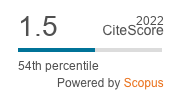The Decline of Liberalism in Europe and how to Revive it
DOI:
https://doi.org/10.2478/cer-2019-0006Keywords:
liberalism, Europe, single market, nation‑state, decentralizationAbstract
The liberal world order has produced immense benefits for Europe and people across the planet. Beginning in the 18th and 19th centuries, liberalism reinforces the natural rights of man to life, liberty and property, and has transformed the world in ways that have improved the material and social circumstances of humankind. But the liberal order that has been in place in Europe since 1945, after two world wars, is showing signs of deterioration. Today, this liberal order is being challenged by a variety of forces. The essence of the European experience is the development of a civilization that considered itself to be a unity and yet was politically decentralized. Former free towns in Italy and the Low Countries became bastions of a self‑governing middle class in the Middle Ages. However, with time, states tend to overgrow taking more and more resources, which results in the increase in taxes and public spending, excessive regulation, deficits and public debt. There is a fight between the advocates of two different ideals of the European Union, the non‑liberal and the liberal vision. There is a consensus in that the market economy is the system that best produces the most, removing millions of people from poverty. But it is the unequal distribution of the wealth created that is often criticized. We examine the distribution of income, before and after taxes and transfers, concluding that market liberalization does not necessarily lead to increased social inequality. On the other hand, two of the most important threats challenging the liberal order in Europe are populist parties and protectionism. Finally, this paper suggests a way towards a future Europe, deepening the single market and economic integration, but transforming the obsolete and dysfunctional nation‑states into other forms of decentralized political units.
Downloads
References
Alesina, A., Spolaore, E. (2003), The size of nations, MIT Press, Massachusetts.
Google Scholar
Algan, Y., Guriev, S., Papaioannou, E., Passari, E. (2017), The European Trust Crisis and the Rise of Populism, “Brookings Papers on Economic Activity”, Fall.
Google Scholar
Bagus, P. (2011), The Tragedy of the Euro, Terra Libertas Limited.
Google Scholar
Berman, Harold J. (1983), The Influence of Christianity on the Development of Western Law, “The Interaction of Law and Religion”, Abingdon Press, Nashville/New York.
Google Scholar
Berman, Harold J. (1983), Law and Revolution: The Formation of the Western Legal Tradition, Harvard University Press, Cambridge.
Google Scholar
Bickerton, C. (2012), European Integration: from Nation‑states to Member‑states, Oxford University Press.
Google Scholar
Blanchard, O. (2018), The Missing Third Leg of the Euro Architecture: National Wage Negotiations, PIIE.
Google Scholar
Boettke, P. (Ed.) (1994), Collapse of Development Planning. NYU Press. Retrieved from http://www.jstor.org/stable/j.ctt9qfq37 (accessed: 15.06.2017)
Google Scholar
Carlyle, R.W., Carlyle, A.J. (1950), A History of Medieval Political Theory in the West, Blackwood, Edinburgh.
Google Scholar
Cubeddu, R. (1997), Atlante del liberalismo, Ideazione, Rome.
Google Scholar
Dahrendorf, R. (1987), Liberalism, in Eatwell, Milgate, and Newman, eds., London.
Google Scholar
Dustmann, C., Eichengreen, B., Otten, S., Sapir, A., Tabellini, G., Zoega, G. (2017), Europe’s Trust Deficit: Causes and Remedies, CEPR Press.
Google Scholar
Foster, C., Frieden, J. (2017), Crisis of Trust: Socio‑economic determinants of Europeans’ confidence in government, Harvard University, Mimeo.
Google Scholar
Franch Parella, J. (2016), La secesión como solución al problema del Estado. El caso de Cataluna, “Procesos de Mercado: revista europea de economia politica”, vol. XII, num. 2, pp. 239–277, Madrid.
Google Scholar
Franch Parella, J. (2018), Unconventional expansionary monetary policies. An economic analysis of quantitative easing, Journal of Business & Economic Policy, Vol. 5, No. 2, pp. 22–28, Alabama.
Google Scholar
Hall, John A. (1987), Liberalism: Politics, Ideology, and the Market, University of North Carolina Press, Chapel Hill, N.C.
Google Scholar
Hayek, F. (2011), The denationalization of money: the argument refined, Ludwig von Mises Institute Publisher.
Google Scholar
Hemerijck, A. (2013), Changing Welfare States, Oxford University Press.
Google Scholar
Hoppe, Hans‑Hermann (2001), Democracy: The God that Failed. The Economics and Politics of Monarchy, Democracy, and Natural Order, Transaction, New Brunswick, N.J.
Google Scholar
Magness, P., Murphy, R. (2015), Challenging the Empirical Contribution of Thomas Piketty’s Capital in the 21st Century, Journal of Private Enterprise, GMU School of Public Policy Research Paper No. 15–2. Available at SSRN: https://ssrn.com/abstract=2543012
Google Scholar
Martin, C. J., Hertel‑Fernandez, A. (2014), How Sweden fights inequality without soaking the rich, VOX. Available at: https://www.vox.com/2014/10/8/6946565/progressive‑taxes‑are‑not‑the‑solution‑to‑inequality (accessed: 18.03.2016).
Google Scholar
Merquior, Jose G. (1991), Liberalism Old and New, Twayne, Boston.
Google Scholar
Milanovic, B. (2016), Global Inequality: a new approach for the age of globalization, Harvard University Press, Boston.
Google Scholar
Mises, L. (2007). Theory and History: an interpretation of social and economic evolution. Ludwig von Mises Institute Publisher.
Google Scholar
Piketty, T. (2014), Capital in the Twenty‑First Century, Harvard University Press, Cambridge.
Google Scholar
Stewart, D. (1966), Biographical Memoir of Adam Smith, Augustus M. Kelley, New York.
Google Scholar
Weber, M. (1949), The Methodology of the Social Sciences, Edward A. Shils and Henry A. Finch (trs. and eds.), Free Press, Glencoe, Illinois.
Google Scholar
Downloads
Published
How to Cite
Issue
Section
License

This work is licensed under a Creative Commons Attribution-NonCommercial-NoDerivatives 4.0 International License.











